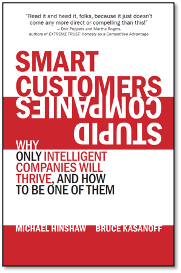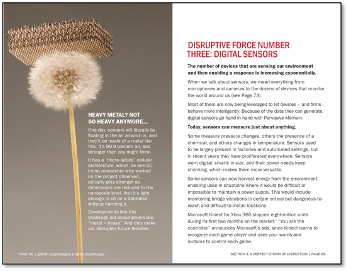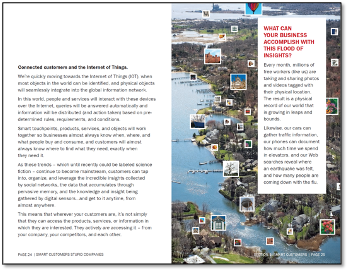Smart Customers, Stupid Companies: The Book
Why Only Intelligent Companies Will Thrive, and How To Be One of Them
Last decade, companies strove to be great. Now, they need to be smart as their customers.
Written by Michael Hinshaw and Bruce Kasanoff, this book is for those who see that digital disruption is changing business and customer experience… and are looking for answers. See why B. Joseph Pine, co-author of The Experience Economy, says to “Follow Hinshaw and Kasanoff's prescription to ride the waves of today's perfect storm of disruptive innovations.”
For the past decade, companies have strived to act at least as smart as their customers (and more importantly, the stakeholders they want to attract).
Today, it’s common knowledge that digitally enabled customers demand anytime, anywhere access to the companies that serve them. Increasingly empowered and disloyal, these customers recognize what many companies don’t: that the world has changed dramatically, but many companies haven’t.
Download Chapter 1
Forget innovation—in our increasingly omni-channel, always-on, customer-first world, many companies aren’t even sure how to keep up. Whether you’re working for a start-up or an established enterprise, this best-selling book is for companies that wish not only to survive, but to thrive. And they can, provided they act decisively and be utterly tenacious in their conviction to act as smart as, or smarter than, their customers.
Focused like a laser on the increasingly critical intersections of customer experience and disruptive innovation, Smart Customers, Stupid Companies spells out exactly what it takes for a company to profit from that intersection instead of getting crushed by it.
“One of the most exciting business books I've ever read”
Don Peppers, author of Customer Experience: What, How, and Why Now



In the book, McorpCX President Michael Hinshaw and co-author Bruce Kasanoff explain that disruptive innovation is “already providing individuals with tools more advanced, in many cases, than the most sophisticated commercial enterprises had just five years ago.”
Success in the years ahead depends on a company’s ability to understand and harness the power of digital disruption, and the four forces described in the book.
These forces include the power of social influence, pervasive memory (does your company remember everything about your customers?), the billions of digital sensors that populate our world, and the physical web, where we interact with the real world much as we interact with the web today.
Meet the Authors

Michael Hinshaw,
Founder and President, McorpCX
Best-selling author on digital transformation and customer experience, Michael is on over a dozen “Global CX Thought Leaders” lists. He's also a Teaching Fellow at UC Berkeley’s Lester Center for Entrepreneurship and Innovation at The Haas School of Business.![]()
![]()
![]()

Bruce Kasanoff,
Founder, Kasanoff Center for Growth
A top 100 voice on LinkedIn with over 800,000 followers, Bruce was named by The Chartered Institute of Marketing as one of the 50 most influential thinkers in marketing and business. Today he works as a ghostwriter, coach, and consultant at the Kasanoff Center for Growth. ![]()
![]()
The structure of an Experience Operating System generates return on investments and continually strives to meet human needs and expectations.
”Neal Berg, global CX strategy and service design leader at Honeywell
You can create a market-leading customer Experience Operating System (XOS) that is worthy of your company's true potential and purpose.
”John Danner, senior fellow, UC Berkeley Haas School of Business and Wall Street Journal best-selling author.
The Experience Operating System (XOS) can help you plan out the next stages of your experience improvement roadmap.
”Tabitha Dunn, Global Head of Customer Experience and Sales Technology for Hitachi, and Chair of the Customer Experience Professionals Association (CXPA)
The Experience Operating System takes you well past buzzwords and lays out a blueprint for making investments in customer experience management that generates a real return for the business and its customers.
”Jeff Sheehan, author of Customer Experience Field Manual: The Guide for Building Your Top Performing CX Program
XOS is a fantastic framework that breaks down the different components, disciplines, and competencies required for an organization to become sustainably customer centric.
”Ian Golding, Certified Customer Experience Professional, international speaker, writer, and Lean Six Sigma Master Black Belt.
The XOS can help you get “unstuck” no matter where you are in the maturity of your efforts.
”Tabitha Dunn, Global Head of Customer Experience and Sales Technology for Hitachi, and Chair of the Customer Experience Professionals Association (CXPA)
The Experience Operating System (XOS) (is) a nexus of technology, data and strategy, enhancing every touchpoint across the customer journey.
”Vivek Bhaskaran, founder and CEO of QuestionPro, a leading customer and employee insights and analytics company with over five million users.
A system that will help you understand, connect with, and nurture relationships with your customers - driving your business's success in a rapidly evolving landscape.
”Elisabeth Zornes, entrepreneurial and innovative chief customer officer and international executive in global high-growth high-tech firms including Zendesk, Microsoft and Cisco.

